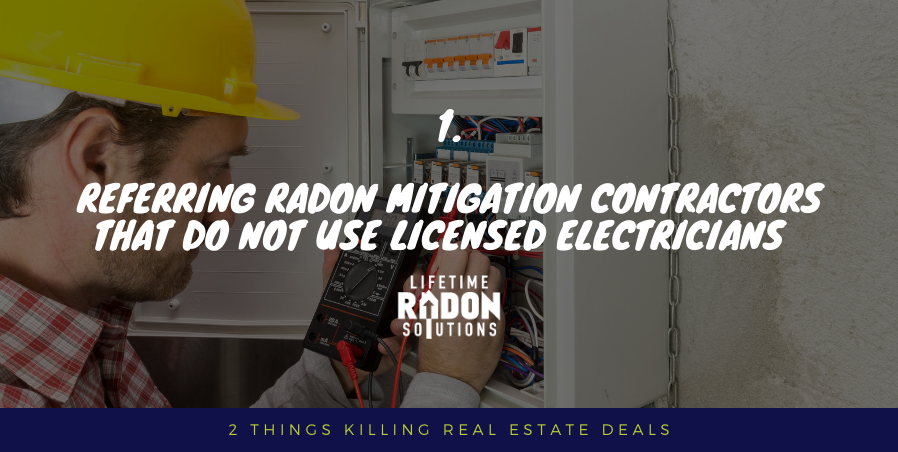1. Referring Radon Mitigation Contractors That Do Not Use Licensed Electricians And/Or Don’t Pull Permits for the Electrical Activation of the Radon System. While price is extremely important, make sure the mitigation company installing your system isn’t less expensive because they are wiring the fan themselves. This can ABSOLUTELY kill real estate deals and we hear about it from our customers nearly EVERY DAY. Here’s why it is not a good idea to use mitigation contractors that do their own electrical and/or don’t hire a licensed electrician to pull the proper permits and install the proper electrical disconnect enumerated in the Wisconsin State Electrical Code. 1. Most radon mitigation contractors ARE NOT licensed electricians so their liability insurance coverage typically does not cover damage or issues related to the homes electrical system. That is, if the unlicensed contractor were to improperly wire the radon system and that ultimately caused electrical damage to the home or harm to any persons on site, the contractors liability coverage would more than likely deny the claim (ultimately leaving the homeowner on the hook) because the contractor would be working outside of their professional scope of work. REMEMBER, ELECTRICAL CURRENT IS NOTHING TO MESS AROUND WITH... not only can electrical issues be extremely expensive to fix but residential electrical current can also be extremely dangerous for both the contractor or anyone home during the install. 2. It is technically against the law. The State of Wisconsin Electrical Code clearly states that licensed electrical contractors should be the only ones doing electrical work. While this may seem frivolous to some (or as one agent told me “it’s like speeding—everyone does it!”) doing anything ILLEGAL in a serious, legal transaction, like real estate, is a huge risk. While hiring a contractor that does their own electrical may save you some money, paying a little extra to do things the right way is more than worth it to ensure that the agent and their client are not taking on any unnecessary legal risk. 2. Referring Radon Companies that Use Passive Radon Test Kits for Their RetestingWhile charcoal radon tests or liquid scintillation radon test kits (both examples of passive test kits commonly used) are a cost effective and helpful tool for many EXISTING homeowners to determine if they have a radon issue, using them as a retest option can absolutely kill real estate deals. Here’s why using passive radon test kits is NOT a good idea in real estate transactions (particularly for retesting). 1. TIMING! While most radon tests kits only take a few days to deploy, you have to wait for both the testing company to process the results as well as rely on the US Postal Service to get the results to the lab in a timely manner. It is startling how many times we get the call “the radon company we used gave my homeowner a radon test kit and it didn’t get to the lab in time so the results came back N/A... can you come out and do a digital test... oh and by the way...we are closing in just a few days!” Moreover, this is even more common during certain times of the year (like the holidays) or right now, during the pandemic, when mail orders for various goods are keeping the postal service busier than ever before. 2. RELYING ON YOU OR YOUR SELLER TO DO THE TEST BEFORE CLOSING! So you hire and pay a radon mitigation contractor to complete a service from start to finish so you can close on the home and ultimately complete your presale contingency. The only problem is, you don’t have the retest results to bring to closing because the contractor left an unopened test kit behind in the vacant property and didn’t tell anyone. Look for a contractor that performs the radon retest for you so you can focus on selling more homes and not worry about whether you or your seller have the time or knowledge to properly administer the test. 3. PASSIVE RADON TEST KIT RETEST RESULTS MAY NOT BE SUFFICIENT FOR CLOSING. As radon in real estate is becoming more commonplace, lenders and title companies are getting more strict and specific with their processes and procedures. Because many passive retests are administered by the homeowner themselves or the listing agent (which brings to light a very obvious conflict of interest) many lenders and title companies are leery of their results. Furthermore, the EPA REQUIRES 2 PASSIVE TEST KITS TO BE PLACED (side-by-side, known as duplicate testing) in their “Homebuyer and Sellers Guide to Radon” While this isn’t overly problematic, when you read the other recommendations and requirements laid out in the Homebuyers and Sellers Guide, its becomes very apparent that a qualified or certified individual really should be administering the test. MOREOVER, MOST CONTRACTORS THAT LEAVE PASSIVE TEST KITS BEHIND RARELY, IF EVER, LEAVE TWO OF THEM! Brian ThompsonLifetime Radon Solutions
0 Comments
|
AuthorBrian S. Thompson Archives
March 2023
|
- Home
-
Locations
- Lifetime Radon Mitigation Minneapolis
- Lifetime Radon Mitigation Milwaukee
- Lifetime Radon Mitigation Fond du Lac
- Lifetime Radon Mitigation La Crosse
- Lifetime Radon Mitigation Oshkosh
- Lifetime Radon Mitigation Eau Claire
- Lifetime Radon Mitigation Wausau
- Lifetime Radon Mitigation Green Bay
- Lifetime Radon Mitigation Janesville
- Lifetime Radon Mitigation Rochester
-
Services
- Radon Mitigation
- Radon Testing
- FREE Radon Testing
- Crawl Space Encapsulation
- Trichloroethylene (TCE)
- Commercial Radon Testing and Mitigation
-
Local Articles
>
- Lifetime Radon Mitigation Brookfield
- Lifetime Radon Mitigation Madison
- Lifetime Radon Mitigation Plymouth
- Lifetime Radon Mitigation Brooklyn Park
- Lifetime Radon Mitigation West Allis
- Lifetime Radon Mitigation Racine
- Lifetime Radon Mitigation Menomonee Falls
- Lifetime Radon Mitigation Muskego
- Lifetime Radon Mitigation Maple Grove
- Lifetime Radon Mitigation Greenfield
- Lifetime Radon Mitigation Franklin
- Lifetime Radon Mitigation Fitchburg
- Lifetime Radon Mitigation Whitefish Bay
- Lifetime Radon Mitigation Hartford
- Lifetime Radon Mitigation New Berlin
- Lifetime Radon Mitigation Shorewood
- Lifetime Radon Mitigation Blaine
- Lifetime Radon Mitigation Appleton
- Lifetime Radon Mitigation Whitewater
- Lifetime Radon Mitigation Cudahy
- Lifetime Radon Mitigation Germantown
- Lifetime Radon Mitigation Sun Prairie
- Lifetime Radon Mitigation Oak Creek
- Lifetime Radon Mitigation Coon Rapids
- Lifetime Radon Mitigation Beloit
- Lifetime Radon Mitigation Grafton
- Lifetime Radon Mitigation Cedarburg
- Lifetime Radon Mitigation Burlington
- Lifetime Radon Mitigation Caledonia
- Lifetime Radon Mitigation Richfield
- Lifetime Radon Mitigation Duluth
- Lifetime Radon Mitigation Brown Deer
- Lifetime Radon Mitigation Sussex
- Lifetime Radon Mitigation South Milwaukee
- Lifetime Radon Mitigation Middleton
- Lifetime Radon Mitigation Waunakee
- Lifetime Radon Mitigation Watertown
- Lifetime Radon Mitigation Mequon
- Lifetime Radon Mitigation Pleasant Prairie
- Lifetime Radon Mitigation Greendale
- Lifetime Radon Mitigation Wauwatosa
- Lifetime Radon Mitigation Glendale
- Lifetime Radon Mitigation Oregon
- Lifetime Radon Mitigation Port Washington
- Lifetime Radon Mitigation De Pere
- Lifetime Radon Mitigation Pewaukee
- Lifetime Radon Mitigation Oconomowoc
- Lifetime Radon Mitigation Manitowoc
- Lifetime Radon Mitigation Verona
- Lifetime Radon Mitigation Stevens Point
- Lifetime Radon Mitigation Fort Atkinson
- Lifetime Radon Mitigation Beaver Dam
- Lifetime Radon Mitigation Little Chute
- Lifetime Radon Mitigation Onalaska
- Lifetime Radon Mitigation Baraboo
- Lifetime Radon Mitigation Waupun
- Lifetime Radon Mitigation River Falls
- Lifetime Radon Mitigation Marshfield
- FAQ's
- Blog
- Meet the Team
- Contact
- Testimonials
- Privacy
Lifetime Radon Solutions, Inc.
Copyright © 2018
Copyright © 2018




 RSS Feed
RSS Feed